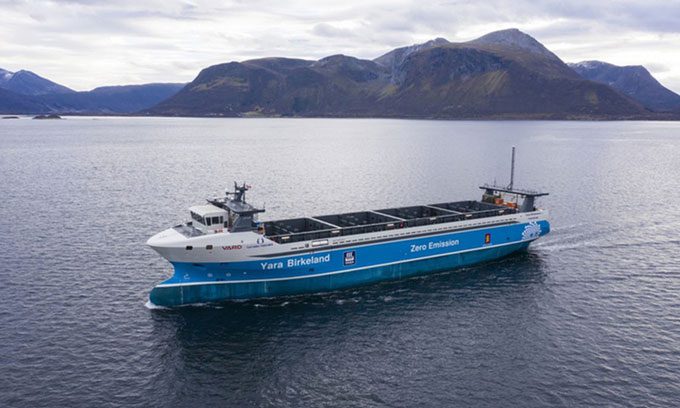The Yara Birkeland is an all-electric vessel capable of carrying 103 containers at a maximum speed of 24 km/h and requires no crew.
Norwegian chemical company Yara International announced that they have built the world’s first fully autonomous, zero-emission cargo ship, CNN reported on August 25. The ship, named Yara Birkeland, is scheduled to make its maiden voyage between the two towns of Heroya and Brevik by the end of this year without a crew. Instead, its movements will be monitored by three data control centers onshore.

The autonomous Yara Birkeland is set to undertake its first journey by the end of this year. (Photo: Yara International)
While the Yara Birkeland is not the first autonomous vessel—an automated ferry was launched in Finland in 2018—it is the first fully electric container ship, according to Yara International. The ship is also designed to reduce nitrogen oxide and CO2 emissions. The shipping industry contributes approximately 2.5% to 3% of global greenhouse gas emissions, according to the International Maritime Organization (IMO).
Nearly all of Norway’s electricity is generated from hydropower, a method often regarded as significantly lower in carbon emissions compared to burning fossil fuels, although it still produces greenhouse gases.
The Yara Birkeland was conceptualized in 2017 and built in collaboration with technology company Kongsberg Maritime and shipbuilder Vard. The vessel can carry 103 containers at a maximum speed of 24 km/h and uses a 7 MWh battery, according to Jon Sletten, a manager at Yara International’s facility in Porsgrunn. It will recharge its battery at the dock before heading to container ports along the coast and returning. The ship could replace 40,000 truck trips annually, Sletten noted.
The Yara Birkeland is not only more environmentally friendly than conventional cargo ships but also helps save operational costs since it does not require a crew. Initially, loading and unloading cargo will need human involvement. However, Sletten mentioned that all operations, including loading, unloading, and docking, will eventually be conducted using automated technology.
Originally, the Yara Birkeland was expected to set sail in 2020. However, COVID-19 and logistical challenges delayed the event. Additionally, experts needed to collaborate with Norwegian maritime authorities to develop regulations for autonomous vessels operating on the country’s waterways.
Fully autonomous ships like the Yara Birkeland have significant potential for the future, according to Rudy Negenborn, a professor of transport and maritime technology at Delft University of Technology in the Netherlands. However, he also noted that many challenges remain before they can be used for long-term commercial voyages at sea.
Operating in large ports may prove to be very difficult, Negenborn observed. “At some point, autonomous ships will need to interact with each other to exchange information and chart non-conflicting routes,” Negenborn stated.
Without crew members to perform maintenance checks, autonomous ships will need to be equipped with self-diagnosing systems capable of detecting and resolving issues or notifying humans for assistance. In addition to technical issues, legal challenges will also arise when autonomous ships navigate between countries.



















































